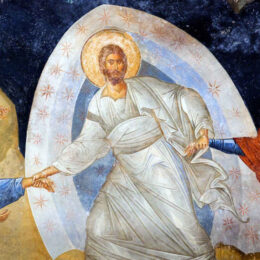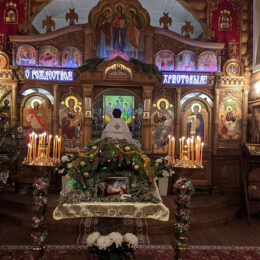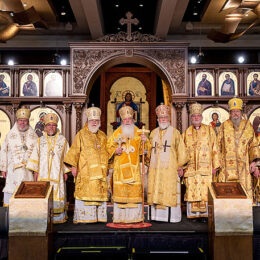![]() by Regis Martin –
by Regis Martin –
When we consider the Christmas Miracle, it is worth recalling the fact that Joseph does not at once repudiate his betrothed, despite his discovery that she is pregnant with another’s child. It is an astonishing development. How painfully bewildering it must have been for him, however, to try and account for a conception for which he was not at all responsible. Still, for all that Joseph is entitled to collect in the way of punitive damages, including death by stoning, he refuses to go that route, resolving instead “to divorce her quietly.”
At which point, of course, an angel of the Lord intervenes, advising Joseph in a dream not to heed the counsel of fear, nor to give way to the demands of justice, but to welcome Mary into his home. How so? Because the Child she bears is the Son of the living God. On whom, following his unforeseen descent into the flesh of the most pure Virgin, Joseph will be asked to confer the blessed name, Jesus, which means Savior. So that having come among us to rescue the least and the lost, he is entitled not only to bear the sacred Name, but to express in his very being-for-others the utter invocability of God himself. In other words, it is now possible for mankind to call directly upon God; no longer do we need to deal with his ministers at a discreet distance. For God really is among us. Emmanuel. He is in our midst.
Only this God saves us from being afraid of the world and from anxiety before the emptiness of life.
Here the saintly Joseph, in making so generous and heroic a provision for Mary, reveals his true greatness, which is far more than a kind heart and a selfless spirit. It is rather the memory of the promise delivered to God’s people that he, Joseph, as a true son of David, longs to see fulfilled. Thanks to so lively and profound a sense of memory, Joseph will open the door of hope to the world. Vistas of limitless promise will loom before us. Mankind will not need to grope in the darkness any longer, nor grovel in the dust beneath the tyranny of death. God will have truly shown himself as one of us because of the magnanimity of one man who opened his home and his heart to the Mystery. “In his greatness,” declares Pope Benedict, “God has let himself become small. God has taken on a human face. Only this God saves us from being afraid of the world and from anxiety before the emptiness of life.”
Great little one! whose all embracing birth
Lifts earth to heaven, stoops heaven to earth.
∼ Richard Crashaw
Nevertheless, how great a distance it must be for God to come down to earth in order that he might encamp about us. And the differences separating us remain, as Kierkegaard reminds us, infinite and qualitative. God—to unpack the metaphysics of Exodus 3—is he who is; and we, and everything else, are all that is not. So God hurls himself into human history in order that everything might begin anew. “Christ is not ‘something’ alongside but ‘something inside,’” exclaims Luigi Giussani. For all the varied vibrations that touch our lives, reaching right down to the very wellsprings of thought and action, the Incarnate Word has come to embrace everything, positively avid to assume and redeem the whole nine yards of human existence.
What does Christ want of us? Only permission to deepen our consciousness of his presence; and then, having captured our attention, to proceed to enrich our lives with the strength and palpability of a continuing presence. “Awareness of the Mystery present,” says Giussani, “makes our life a constant stream of novelty. With the acknowledgement of this dramatic presence, with this presence in which the divinity dwells in the flesh, something new ‘begins’—today, at eleven o’clock, at one o’clock, at six, at ten; tomorrow at three, or at four. At any moment at all, something new begins.”
What could possibly be more appealing than the prospect, endlessly and wondrously repeated, of beginning over and over again? But it cannot happen without Christ. Without that unique saving presence he brings to each passing moment—the kairos of eternity bursting through the clouds of mere kronos—we cannot begin anything. Certainly not the great adventure of creatures made in God’s image. “We cannot sustain love for ourselves,” warns Giussani, “unless Christ is a presence, as a mother is a presence for her child. Unless Christ is a presence now—now!—I cannot love myself now and I cannot love you now.”
Why so pandemic a resistance to having God in our midst?
So why have so many, especially in our own time, refused? Why so pandemic a resistance to having God in our midst? Indeed, why such disdain for God’s holy Mother, the very one who, says Hopkins, “Gave God’s infinity / Welcome in womb and breast / Birth, milk, and all the rest…”?
Who can account for so massive and methodic a dismissal of the central event of human history? An event, moreover, of such shattering importance that unless it is true, it hardly matters what is true. Our lives are lost in a vast and terrible sea of nihilism. “With the advent of Christ,” writes Romano Guardini, “man confronted a decision which placed him on a new level of existence … man’s existence took on an earnestness which classical antiquity never knew…. This earnestness did not spring from a human maturity; it sprang from a call which each person received from God through Christ. With this call the person opened his eyes, he was awakened for the first time in his life.” And who knows?—maybe the whole post-modern malaise is that we no longer wish to open our eyes, preferring self-inflicted blindness to belief in Christ.
What could be greater than to allow oneself to be embraced by the arms of the Incarnate God?
In any final reckoning of motive, it seems to me, such impacted hostility amounts to a failure of magnanimity, a virtue whose exercise dear Saint Joseph brought to the highest pitch of perfection. And what is magnanimity? It is the desire always and everywhere to aspire to greatness, and thus to despise and reject all that is mediocre. It is to open our eyes to behold the Eternal Child coming into our midst in order to bestow the grace of salvation. What could be greater than to allow oneself to be embraced by the arms of the Incarnate God? And then to extend that enfleshment to others, to a world thirsting for truth that you can really see and smell, taste and touch. “I am only a man,” says the poet Czeslaw Milosz. “I need visible signs. / I tire easily, building the stairway of abstraction.”
Could there be any vocation worthier than this: That Christ’s presence continues in one’s own life? And then to carry Christ to others?
O, like a tiny cradle,
Could thy heart become,
God would on earth again
Be born an infant son.
∼ Angelus Silesius
Resistance to so ennobling an endeavor was the defining sin of that movement of so-called Enlightenment thought that arose more than two centuries ago. Fallout continues to infect the culture, especially in its operative refusal to admit even the possibility of God revealing himself as a human being.
But is it really true that God is somehow intrinsically unable to show himself in human history? Pray, what is the point of being God if you can’t visit your own potty little world? Yes, even if you have to suspend a law or two of the universe to pull it off. [Actually He didn’t. As C.S. Lewis so brilliantly explained, God did not suspend the laws He created but took a short-cut working descending into His creation.] It is the Eternal Child for whom all creation cries. A world fallen and defiled awaits rebirth. And from the ashes Christ tells us it shall arise.
Merry Christmas everyone….
HT: Crisis Magazine
![]()



